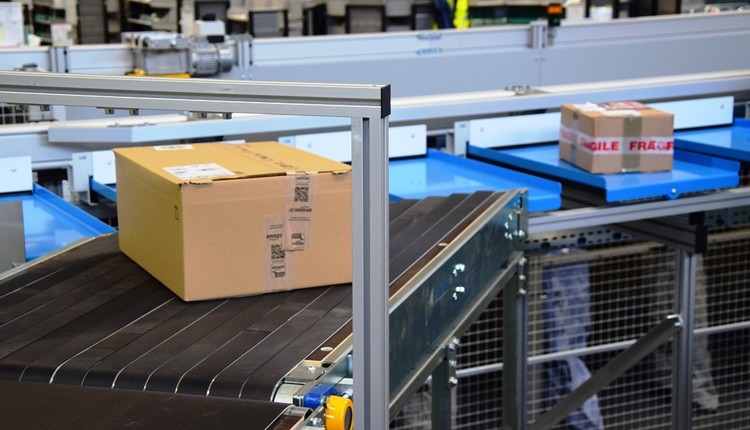MEMPHIS, Tenn. -- FedEx Express, a subsidiary of FedEx Corp. (NYSE: FDX) and the company that invented overnight shipping 38 years ago, has made international express shipping even faster with the unveiling today of its first Boeing 777 Freighter (777F) during ceremonies with The Boeing Company in Everett, Wash. FedEx Express is the first U.S.-based global all-cargo freight airline to take delivery of the 777F, and has placed the largest order for the aircraft model to date.
“The Boeing 777 is an extraordinary testament to our dedication to fleet enhancement, allowing FedEx Express to provide unmatched services to our customers around the world,” said David J. Bronczek, president and chief executive officer, FedEx Express. “Its payload capacity, range and environmental efficiencies create well-rounded, long-term strategic value for our company in meeting the global shipping demands of customers.”
Introduction of the 777F to the FedEx fleet of more than 650 aircraft expands what is already the world’s largest cargo airline. Its international routes will provide service benefits to customers and enhance the efficiency of the FedEx Express global network.
The 777F is the world’s largest twin-engine cargo aircraft. Its flight range, the equivalent of about 6,675 land miles, or nearly three times the approximate distance between the east and west coasts of the U.S., is the longest of any two-engine freighter, with a payload capacity of 215,000 pounds (98 metric tons).
This represents an increase in range of more than 2,400 miles and an additional 14,000 pounds of payload over the MD-11 freighter, which until now has been the primary long-haul aircraft in the company’s fleet.
The global freighter’s range enables FedEx Express to fly between major markets and hubs in Asia, Europe and the U.S. with more freight and in less time than it takes today, allowing later cut-off times for customers in the markets to drop off their shipments. For example, 777F transit times from points in Asia to the U.S. will be from one to three hours faster than those of the MD-11.
In addition to service enhancements the aircraft provides for our customers, the freighter also delivers noteworthy environmental benefits and efficiencies:
• Uses 18 percent less fuel than an MD-11;
• State-of-the-art engine technology reduces emissions 18 percent;
• Advanced noise-reduction technology meets airport noise standards and makes landings and takeoffs quieter;
• Has lower maintenance and operating costs than other aircraft in its class.
“The 777F is a game-changer,” said Michael L. Ducker, president, International, FedEx Express. “Its operational efficiencies and environmental benefits alone are impressive, but combine those advantages with the service improvements it delivers and FedEx will be able to take international shipping to another level. Our customers around the world will benefit from more point-to-point routes and the shorter flight times, increasing their competitiveness in the global marketplace.”
By April 2010, FedEx Express plans to have four 777Fs serving routes between Asia and the U.S. In all, there will be 15 777Fs in the company’s fleet by the end of fiscal 2014; FedEx Express also has a second order of 15 777Fs, which will be delivered between fiscal 2014 and fiscal 2019, and holds options on 15 more 777Fs.
About FedEx
FedEx Corp. (NYSE: FDX) provides customers and businesses worldwide with a broad portfolio of transportation, e-commerce and business services. With annual revenues of $34 billion, the company offers integrated business applications through operating companies competing collectively and managed collaboratively, under the respected FedEx brand. Consistently ranked among the world’s most admired and trusted employers, FedEx inspires its more than 275,000 team members to remain “absolutely, positively” focused on safety, the highest ethical and professional standards and the needs of their customers and communities.
“The Boeing 777 is an extraordinary testament to our dedication to fleet enhancement, allowing FedEx Express to provide unmatched services to our customers around the world,” said David J. Bronczek, president and chief executive officer, FedEx Express. “Its payload capacity, range and environmental efficiencies create well-rounded, long-term strategic value for our company in meeting the global shipping demands of customers.”
Introduction of the 777F to the FedEx fleet of more than 650 aircraft expands what is already the world’s largest cargo airline. Its international routes will provide service benefits to customers and enhance the efficiency of the FedEx Express global network.
The 777F is the world’s largest twin-engine cargo aircraft. Its flight range, the equivalent of about 6,675 land miles, or nearly three times the approximate distance between the east and west coasts of the U.S., is the longest of any two-engine freighter, with a payload capacity of 215,000 pounds (98 metric tons).
This represents an increase in range of more than 2,400 miles and an additional 14,000 pounds of payload over the MD-11 freighter, which until now has been the primary long-haul aircraft in the company’s fleet.
The global freighter’s range enables FedEx Express to fly between major markets and hubs in Asia, Europe and the U.S. with more freight and in less time than it takes today, allowing later cut-off times for customers in the markets to drop off their shipments. For example, 777F transit times from points in Asia to the U.S. will be from one to three hours faster than those of the MD-11.
In addition to service enhancements the aircraft provides for our customers, the freighter also delivers noteworthy environmental benefits and efficiencies:
• Uses 18 percent less fuel than an MD-11;
• State-of-the-art engine technology reduces emissions 18 percent;
• Advanced noise-reduction technology meets airport noise standards and makes landings and takeoffs quieter;
• Has lower maintenance and operating costs than other aircraft in its class.
“The 777F is a game-changer,” said Michael L. Ducker, president, International, FedEx Express. “Its operational efficiencies and environmental benefits alone are impressive, but combine those advantages with the service improvements it delivers and FedEx will be able to take international shipping to another level. Our customers around the world will benefit from more point-to-point routes and the shorter flight times, increasing their competitiveness in the global marketplace.”
By April 2010, FedEx Express plans to have four 777Fs serving routes between Asia and the U.S. In all, there will be 15 777Fs in the company’s fleet by the end of fiscal 2014; FedEx Express also has a second order of 15 777Fs, which will be delivered between fiscal 2014 and fiscal 2019, and holds options on 15 more 777Fs.
About FedEx
FedEx Corp. (NYSE: FDX) provides customers and businesses worldwide with a broad portfolio of transportation, e-commerce and business services. With annual revenues of $34 billion, the company offers integrated business applications through operating companies competing collectively and managed collaboratively, under the respected FedEx brand. Consistently ranked among the world’s most admired and trusted employers, FedEx inspires its more than 275,000 team members to remain “absolutely, positively” focused on safety, the highest ethical and professional standards and the needs of their customers and communities.




